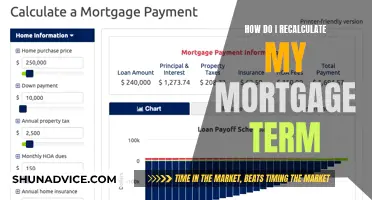
If you own rental properties, you may be wondering how to add an EIN to your mortgage and deed. An EIN, or Employer Identification Number, is a tool provided by the IRS to help manage taxes for businesses, organizations, and some retirement trusts. While adding an EIN to a mortgage and deed may be a complex process, it is possible. This process may be different depending on the state in which you reside. Some steps you may need to take include forming a legal entity, such as an LLC or partnership, and then applying for an EIN. It is important to note that you will need to meet specific requirements and may need to provide additional documentation.
Characteristics and Values
| Characteristics | Values |
|---|---|
| What is an EIN? | An EIN is an employer identification number. |
| Who issues an EIN? | The Internal Revenue Service (IRS) issues EINs. |
| How to get an EIN? | Apply for an EIN directly from the IRS online, by phone, fax, or mail. |
| Cost of an EIN? | An EIN is free. Beware of websites that charge a fee for an EIN. |
| Who needs an EIN? | Businesses, organizations, and some retirement trusts. |
| When to get an EIN? | When forming a legal entity (LLC, partnership, corporation, or tax-exempt organization). |
| Why get an EIN? | To manage taxes. |
| What is a mortgage? | A mortgage is a secured debt, where a qualified home is put up as collateral to protect the lender. |
| What is a deed? | A deed is an instrument signed to make ownership of a qualified home security for payment of a debt. |
| How to put an EIN on a mortgage and deed? | Ensure the properties are in the name of the partnership, not an individual. The partnership can then apply for a new mortgage with the EIN. |
What You'll Learn

How to get an EIN for free and in minutes
Applying for an Employer Identification Number (EIN) is a free service offered by the Internal Revenue Service. You can get your EIN in minutes for free. The application is available Monday to Friday, 7 a.m. to 10 p.m. Eastern Time. You can apply for only one EIN per responsible party per day.
The Internet EIN application is the preferred method for customers to apply for and obtain an EIN. Once the application is completed, the information is validated during the online session, and an EIN is issued immediately. You can also apply by phone, fax, or mail. If your principal place of business is outside the U.S., you must apply by phone, fax, or mail.
To apply online, you must complete the application in one session. You can't save it for later. It expires after 15 minutes of inactivity, and you’ll need to start over. You will need the responsible party’s Social Security or individual taxpayer ID number (ITIN).
If you are forming a legal entity (LLC, partnership, corporation, or tax-exempt organization), form your entity through your state before you apply for an EIN. If you don’t form your entity with your state first, your EIN application may be delayed.
Transferring Your Mortgage: Navigating Away from Selene
You may want to see also

The benefits of forming an S-Corp
An S-Corp, or S Corporation, is a special designation in the U.S. that provides corporations with a "tax election" option. This allows corporations to pass their profits, losses, deductions, and credits through to their shareholders, who then report the flow-through of income on their personal tax returns.
Avoid Double Taxation:
S-Corps allow corporations to avoid double taxation on corporate income. In a traditional C-Corp structure, profits are taxed at the corporate level and then taxed again as dividends when distributed to shareholders. In contrast, S-Corps are considered pass-through entities, and income is taxed only at the shareholder level, which can result in significant tax savings for the business.
Limited Liability Protection:
S-Corps provide limited liability protection, meaning that the owners' personal assets are shielded from business creditors and legal claims. This protection is similar to that offered by a C-Corp structure, providing owners with peace of mind and security.
Enhanced Credibility:
Operating as an S-Corp can help establish credibility for a new business. Customers, employees, vendors, and partners may view the S-Corp structure as a sign of a formal commitment to the business, which can facilitate relationships and partnerships.
Tax Advantages:
In addition to avoiding double taxation, S-Corps offer tax advantages such as tax deductions for business expenses and wages paid to employees. S-Corp owners can also lower their personal income tax liability by characterizing money received from the business as salary or dividends.
Simplicity and Flexibility:
Compared to forming a C-Corp, establishing an S-Corp is generally a simpler process with fewer requirements and less complexity. S-Corps have more flexibility in terms of shareholder types and governance, and they are not subject to the same strict management requirements as C-Corps.
While there are many benefits to forming an S-Corp, it's important to note that there are also some potential drawbacks and restrictions. For example, S-Corps have limitations on the types of investors they can have and may face challenges in achieving certain growth trajectories. Additionally, there may be state-specific requirements and ongoing fees associated with operating as an S-Corp.
Making Mortgage Payments: Wells Fargo Guide
You may want to see also

The importance of a secured debt
A secured debt is backed by collateral, which the lender has a lien on. This provides the lender with added security when lending money. The collateral is usually in the form of a home or a car, which the lender can seize and sell to recoup the debt if the borrower defaults on their payments. This is why unsecured debt is considered a riskier investment than secured debt.
Secured debts are created with liens, which can be either voluntary or involuntary. Home mortgages and car loans are examples of voluntary secured debts, while real property tax liens are involuntary. When an individual takes out a mortgage, they usually voluntarily agree to give the lender a security interest in their property. This is done by signing a mortgage or deed of trust, which grants the lender a security interest or lien against the property. In the case of a mortgage, the borrower typically retains the equitable right to make payments and keep exclusive possession of the property until they default on the loan. At this point, the lender can enforce a home loan by foreclosing its mortgage or deed of trust.
The process of foreclosing on a mortgage can vary depending on the state and the type of security instrument used. In some states, foreclosure may not require any court action and can be completed within a few months. In other states, court approval is needed, which can extend the process. It is important to note that secured creditors must follow certain rules, such as not trespassing on private property or breaching the peace, even when repossessing cars or other motor vehicles.
The use of secured debt can be beneficial for both lenders and borrowers. For lenders, it reduces the risk associated with lending, especially to individuals or companies with low credit ratings. By having collateral to seize and sell, lenders can be more confident in lending out money. For borrowers, secured debt can provide a way to obtain funding even with poor creditworthiness. Additionally, the interest rates on secured debt are typically lower than those on unsecured debt.
Protecting Your Documents When Applying for a Mortgage
You may want to see also

The role of the responsible party
In a single-member LLC, the owner must be the responsible party, while in a multi-member LLC, any member can be designated, but they must be willing to take on the responsibility of ensuring that all taxes are filed correctly and on time. It is important to note that being the responsible party does not make one personally liable for business debts or legal issues, except in cases of deliberate tax evasion or provision of false information to the IRS.
When it comes to partnerships, there may be multiple partners who could be considered the responsible party, and the business can choose which one will be recognized and communicated with by the IRS. In the case of a corporation, the principal officer is typically named as the responsible party. This responsible party must have a tax identification number, such as an individual taxpayer number or Social Security number, to qualify for this status.
The responsible party is the person the IRS will contact regarding the EIN or any tax-related issues. They are also required to sign the Form SS-4, which is used to apply for an EIN. It is worth noting that a nominee, such as an attorney or registered agent, cannot be named as the responsible party on the EIN application, as the IRS wants to communicate directly with the person truly responsible for the business.
Understanding Mortgage Debt: Strategies for Homeowners
You may want to see also

How to qualify for a home mortgage interest deduction
To qualify for a home mortgage interest deduction, several conditions must be met. Firstly, you must file Form 1040 or 1040-SR and itemize deductions on Schedule A (Form 1040). This means that you need to list and account for specific expenses, including mortgage interest, property taxes, and partial medical expenses. Secondly, the mortgage must be a secured debt on a qualified home in which you have an ownership interest. This means that the loan must be secured by your primary or secondary home, and the funds borrowed must be used to buy, build, or substantially improve the home that secures the loan.
It is important to note that any other homes beyond the secondary home, such as a third or fourth home, do not qualify for a mortgage interest deduction. Additionally, the mortgage balances must meet certain limits. For married couples filing jointly, the limit is $750,000, while for those filing separately, the limit is $375,000. If the debt was incurred prior to December 16, 2017, the limits are $1 million and $500,000, respectively.
Furthermore, to qualify for the deduction, you must have paid interest on the mortgage during the tax year. The amount of the deduction is based on a fraction of the interest paid on the mortgage, and it reduces your taxable income within your tax bracket. For example, if you paid $12,000 in mortgage interest and your income tax rate is 24%, you can exclude $12,000 from your income tax liability, resulting in a savings of $2,880.
It is worth noting that if you receive a nontaxable housing allowance from the military or ministry, you can still deduct your home mortgage interest. Additionally, if you are divorced or separated and you or your ex-spouse need to pay the mortgage on a jointly owned home, the interest may be considered alimony, and you may be able to deduct it.
Paying Off Your Mortgage Faster: Strategies for Success
You may want to see also
Frequently asked questions
If you want to put an EIN on the deed for your rental properties, you must first put the deeds in the name of your partnership. Then, the partnership can apply for a new mortgage. Note that you can get an EIN for free from the IRS.
An EIN stands for Employer Identification Number. It is a unique number that identifies a business entity for tax purposes.
Putting an EIN on your mortgage and deed can help protect your personal assets in the event of a lawsuit. It can also provide tax benefits, such as the ability to deduct home mortgage interest.







